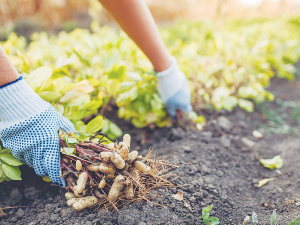MPI Hails Kiwifruit Boom as Horticulture Revenue Surges Past $9 Billion
Ministry for Primary Industries (MPI) Director General Ray Smith is giving a big shout-out to the horticulture sector, especially kiwifruit.
 MPI believes establishing a peanut industry in Northland would help diversify its regional economy and create employment.
MPI believes establishing a peanut industry in Northland would help diversify its regional economy and create employment.
A peanut growing industry may be established in New Zealand if current trials are successful.
Field trials across five sites in Northland have just been harvested as part of a $1 million project looking into the feasibility of commercially growing the nuts in New Zealand for peanut butter.
The project is funded by Picot Productions (makers of Pic’s Peanut Butter), Ministry for Primary Industries’ Sustainable Food and Fibre Futures fund and Northland Inc, following a successful one-year feasibility study in 2021.
Greg Hall, project manager at Northland Inc, told Hort News the farmers involved in the trials are a mix of private and iwi landowners across five sites, with a mix of dairy and beef farming. Currently they also grow maize and silage for stock feed.
Northland was chosen for a combination of climatic factors.
“Firstly, it’s warmer which means the peanuts can be planted earlier and have a longer growing season which maximises yield and secondly there is generally more reliable rainfall over summer," says Hall.
“Other important factors to producing commercial yields of good quality peanuts are friable soils as in sandy loams and access to irrigation if natural rainfall is not sufficient.”
Further farmers would be required if a successful trial moves forward into the commercial space, he says.
“A business case will be developed as part of the trials to give the hard data required to help establish a new emerging industry and the best way forward to maximise farmgate returns, for example this could be a cooperative model.
“Peanuts being a legume act as a nitrogen fixer and can easily sit within a farming rotational system, helping reduce the need for nitrogen application.”
Pic’s currently imports about 2,500 tonnes of nuts to produce its peanut butter each year. Kiwi crops wouldn’t be able to completely fulfil this demand, but owner Pic Picot says even having a portion grown locally would be a real win.
Pic’s alone churns through one tonne of peanuts every hour to produce as many as 28,000 jars of peanut butter every single day.
A sample harvest during the feasibility study in 2021 saw promising results and this year’s crops have provided further information on the cultivars most suited for potential commercial viability in the Northland climate.
Final results are due to be delivered in the coming months including an all-important taste test.
Vaughan Cooper, acting chief executive of Northland Inc, says the trial allows them to assess the opportunity and potential benefits of creating a new industry within Northland, while taking the risk out of diversification for our farmers.
When run at scale the group behind the trial estimates crops could produce enough nuts for 4,500 jars of peanut butter per hectare, but the aim would be to double this to around 10,000 over time.
Picot made his first peanut butter in a concrete mixer in his garage in 2007. Pic’s is sold in supermarkets around New Zealand and Australia, and in Hong Kong, Singapore, Malaysia, China, the UK, and the US.
Fonterra’s impending exit from the Australian dairy industry is a major event but the story doesn’t change too much for farmers.
Expect greater collaboration between Massey University’s school of Agriculture and Environment and Ireland’s leading agriculture university, the University College of Dublin (UCD), in the future.
A partnership between Torere Macadamias Ltd and the Riddet Institute aims to unlock value from macadamia nuts while growing the next generation of Māori agribusiness researchers.
A new partnership between Dairy Women’s Network (DWN) and NZAgbiz aims to make evidence-based calf rearing practices accessible to all farm teams.
Despite some trying circumstances recently, the cherry season looks set to emerge on top of things.
Changed logos on shirts otherwise it will be business as usual when Fonterra’s consumer and related businesses are expected to change hands next month.

OPINION: Here w go: the election date is set for November 7 and the politicians are out of the gate…
OPINION: ECan data was released a few days ago showing Canterbury farmers have made “giant strides on environmental performance”.